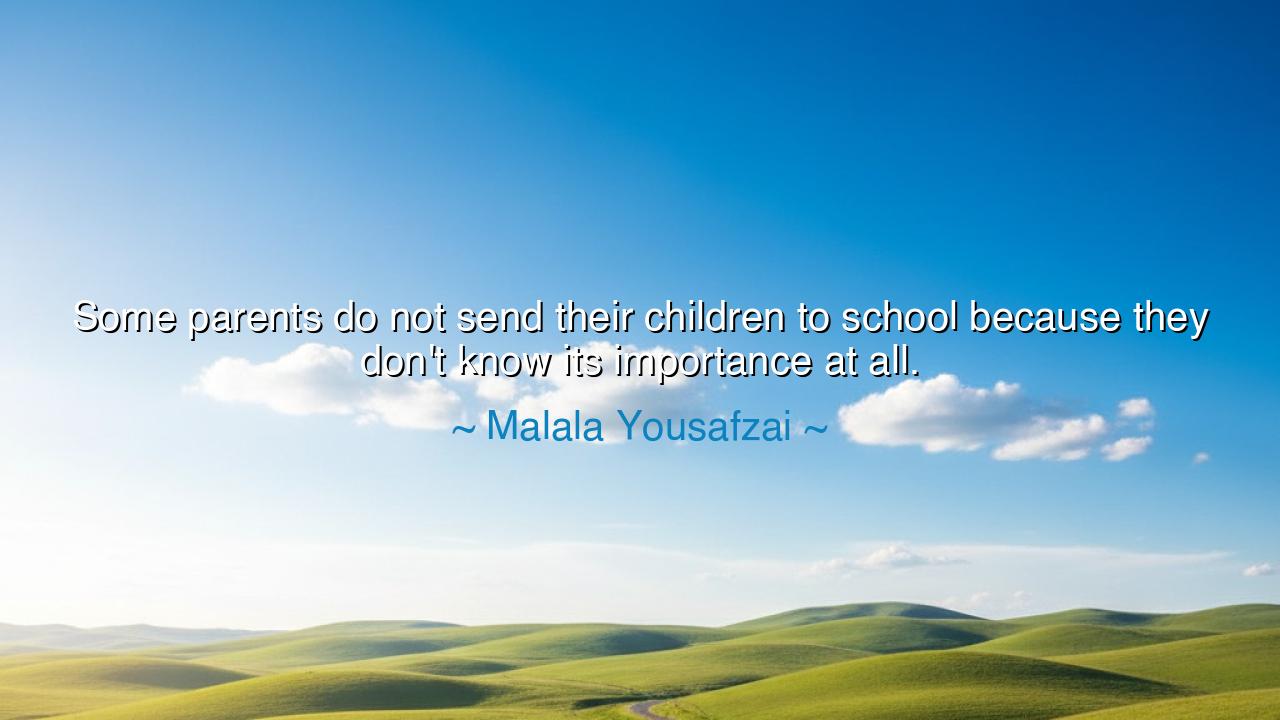
Some parents do not send their children to school because they
Some parents do not send their children to school because they don't know its importance at all.






“Some parents do not send their children to school because they don't know its importance at all.” Thus spoke Malala Yousafzai, the young heroine who raised her voice in the shadow of violence, daring to proclaim the power of learning when others sought to silence her. Her words are both lament and revelation: a lament that ignorance blinds many to the treasure of education, and a revelation that knowledge must be cherished, defended, and shared if humanity is to rise from the darkness of poverty and oppression.
The meaning of this saying is simple, yet heavy with consequence. There are families who, not knowing the value of education, withhold their children from schools—not from cruelty, but from blindness. They see labor for survival as more urgent than lessons, or they inherit traditions that dismiss the power of reading and writing. Malala reminds us that ignorance of education’s importance is itself a chain, passed from generation to generation, leaving children unprepared to claim their rightful place in the world.
Malala herself was born in Pakistan’s Swat Valley, where the Taliban sought to strip away the right of girls to study. She saw with her own eyes that when parents did not grasp the sacred power of education, their children became easy prey to forces of tyranny. Yet Malala, even as a child, recognized that a classroom is more than a room of desks—it is the forge of freedom, the seed of opportunity, the lamp that lights the future. For this conviction, she was attacked, yet from her suffering, her voice grew louder, until the whole world heard her cry: let every child learn.
History echoes her truth. In the days of slavery in America, it was forbidden for the enslaved to read and write. Many parents, themselves denied education, could not pass on its value. Yet figures like Frederick Douglass, who secretly learned his letters, proclaimed that knowledge was the pathway from slavery to freedom. He declared that once a slave could read, he could no longer be truly chained. His story reveals that the tragedy of denying education is not merely loss of skill, but loss of liberty.
So too, in many lands, generations have been bound in poverty because parents, never taught the importance of schooling, kept their children from it. They saw education as a luxury rather than a necessity, not realizing that through it, their sons and daughters could rise beyond the burdens they themselves endured. Thus Malala’s words are not condemnation, but a call: awaken the parents, so that they may awaken the children. For only when the elders see, will the young be free to dream.
The lesson for us is clear. We must not take education for granted. Those who know its value must teach others, not only with words but with example. Parents must see schooling not as a distraction from survival, but as the very means of survival in the long road ahead. Teachers must carry their mission with sacred fire, showing communities that every book opened is a door unlocked. And children who are given the gift of education must carry it humbly, remembering that millions are still denied what they possess.
So let us hold Malala’s words as a guiding star: “Some parents do not send their children to school because they don’t know its importance at all.” Then let us labor to spread that knowledge, to break the chains of ignorance, and to make the classroom as common and sacred as the hearth. For when a child learns, a family rises. When families rise, nations are transformed. And when nations are transformed, humanity steps closer to freedom. Thus the path forward is clear: awaken the world to the power of education, until no child is left behind in the darkness.






AAdministratorAdministrator
Welcome, honored guests. Please leave a comment, we will respond soon